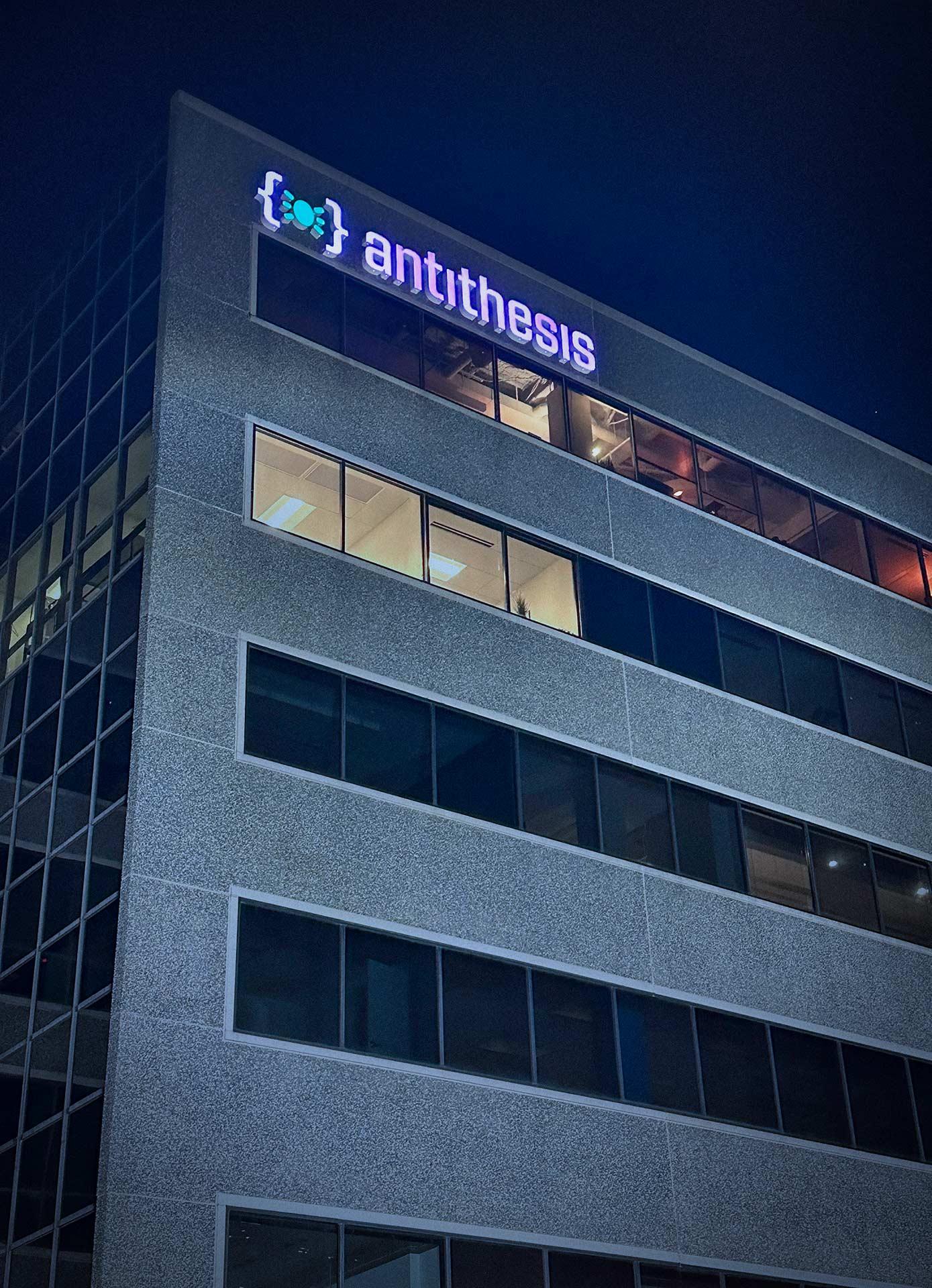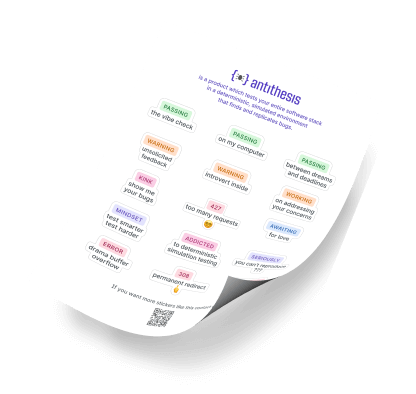How to make your own luck

It’s basically a cliche at this point for founders to write the “my experiences from one year of blah” post. Not quite “our incredible journey”-level, but getting there. And why not? It’s pure Hacker News catnip, practically guaranteed to get you views from the people who run the companies that you sell to and buy from in the Great Venture Flywheel / Startup Circle of Life. So I suppose I have to do one.
But this post is a little different (just like all the others are), because it’s more in the nature of a report on a controlled experiment. You see, Antithesis was in stealth for SIX AND A HALF YEARS before our launch last February. Yes, the first stretch of that was deep R&D as we built our deterministic hypervisor, our autonomous state space explorer, our reactive programming and visualization environment, and a few things still on the way such as [REDACTED] and [REDACTED]. But for some of that time we were just doing normal company things – recruiting, selling, raising money, the works. But… you know, without a website.
In fact, we were such a real company before the launch, we even managed to convince ourselves that the launch wouldn’t be a very big deal. Internally, we referred to it as the “marketing launch”: an implicit statement that it was only really changing the job of one part of the company, and that business would otherwise go on as usual. In hindsight this view was clearly insane (and a great example of the kind of groupthink that is one of the biggest risks of being in stealth). But I think the specific ways that it was wrong are pretty interesting, perhaps even to people who don’t intend to spend six and a half years in stealth. So here it is, my early 2010s-style listicle of four things I learned about not being in stealth:
Marketing isn’t just about lead-gen
The first of these lessons is probably already obvious to everybody who isn’t me: marketing isn’t just about lead-gen. I expected that after our launch it would get easier to find prospects,1 what I was not expecting was that it also radically shortened our deal cycles and improved our close rate. In hindsight it’s obvious. Imagine having the “yeah, there’s no website, but I swear it’s a real company” conversation with everybody you sell to. Imagine your poor customer champions trying to have that conversation with their boss. Even if it doesn’t kill the deal outright, it injects latency into the process, raising your customer acquisition cost and making it vastly harder to scale your sales org, because it takes longer for each new rep to see every stage of the process. Also, time kills all deals. So even if the lack of public presence doesn’t kill the deal outright, it statistically raises the mortality rate.
It’s actually worse than you think. Enterprise sales are a little like congressional appropriations – a multi-stakeholder process where a huge number of people need to agree in order for anything to happen.2 But what that means is that altering the average probability of somebody vetoing has an outsized effect on close probability. Say there are 20 people who need to not veto the deal, and say each of them has a 2% chance of doing it. Then the odds of the deal happening are (1-0.02)20, about 67%. A tiny change to the veto probability in absolute terms (say, because people aren’t going: “I’ve never heard of that company”) has a huge impact on the odds.
The effect actually gets more extreme when you leave the simplified model and consider that people are different. What if one of those 20 people is the person who will never buy something they haven’t heard of? The more different personalities are involved, the more important it is that you not give any of them a reason to hate you (logrolling again!).

No really, marketing isn’t just about lead-gen
Okay, so the second lesson from our year out of stealth is probably also familiar to you, because it’s the same as the first one: marketing isn’t just about lead-gen. Marketing is also for your own people! One dimension of this I was already keenly aware of: the morale effect. Throughout our long slog through stealth, I knew that not being able to brag about where they work or send articles to friends and loved ones, etc., was going to be a continual weight on every one of our employees.3 That was an expected part of the calculation, and a cost we embraced with open eyes.
What I didn’t realize was that not having any kind of public messaging is also a handicap when it comes to internal alignment and communication. So much of running a growing company is just getting people on the same page – in terms of technology and product vision, culture, strategy, everything. Vast amounts of ink have been spilled on this topic so I won’t rehash it. But the thing I didn’t quite get was that if you have robust external messaging, then all of the internal communications can free-ride on that to some extent (unless your internal and external presentation are radically different). You’re telling the world 24/7 about who you are, and your employees are part of the world, so they get the message too.
You won’t believe this
The third lesson, and you won’t believe this one, is that marketing isn’t just about lead-gen. It’s also about recruitment and hiring! See: pretty much every developer-facing blog post from a FAANG company ever. Sure enough, when we came out of stealth our inbound candidate pipeline exploded, but what was interesting is that it solved one problem while creating another. When we were in stealth it was brutally hard to recruit people, but the people we did get were former colleagues, plus the rare soul who somehow found out about us and then wanted so badly to work here that they figured out how to get in touch. In other words, candidates were rare, but the qualification process was trivial.4
I’ve worked in big tech, where they have the exact opposite problem. Pretty much everybody on planet earth has heard of Apple and Google, and… pretty much everybody on planet earth has also applied to those places. Their candidate stream is infinitely large and their qualification problem is correspondingly infinitely hard. A decade or so ago, blog posts of the form: “I applied to a big tech company and had a horrible experience” were very popular. On the one hand, I sympathize, I have also applied to big tech companies and had a few horrible experiences. On the other hand, I sympathize, because I’ve been on the hiring side at Google and have seen that the problem they’re solving is impossible.
We are very far from Google, but coming out of stealth moved us noticeably towards their end of the pipeline/qualification tradeoff. Overall it’s been a net positive, but I’d be lying if I didn’t say our hiring processes have had to adjust as a consequence.
And in conclusion
My last and final lesson is that marketing isn’t just about lead-gen. It’s also about engineering your own serendipity. There’s a whole preachy genre of self-help books screeching that you should never leave your airplane seatmate alone because if you talk to them they may change your life. As an introvert I find this advice deeply annoying, but it contains a grain of truth. You may not control the universe’s random-number generator, but you do have some influence over when it’s accessed. This is the sense in which we all make our own luck: we make opportunities for luck to strike. Systematically creating situations in which good luck could do something (and conversely, avoiding ones where bad luck could screw you) actually does bend the odds in your favor.
Telling the world you exist is an important part of this. Yes, we have gotten plenty of inbound job applicants, prospective customers, and interested investors. But my favorite emails are the ones from the randos who just thought the idea was cool, and want to talk. A small but real fraction of those randos turn out to be incredibly impressive people with extremely relevant ideas, connections, or suggestions. In a way, it cancels out some of the penalty of not being in the San Francisco Bay Area. What I’ve always loved about SF is how you walk out for coffee and trip over five people deeply relevant to your business; but having a loud and lively web presence gives you a very diluted version of that for the entire world.5 Rather than tripping over them, they’re tripping over you and sending you an email (and the people who are in SF have computers and email addresses too).
And now, dear reader, you too have tripped over us. Want to send me an email? Who knows what will happen if you do.





